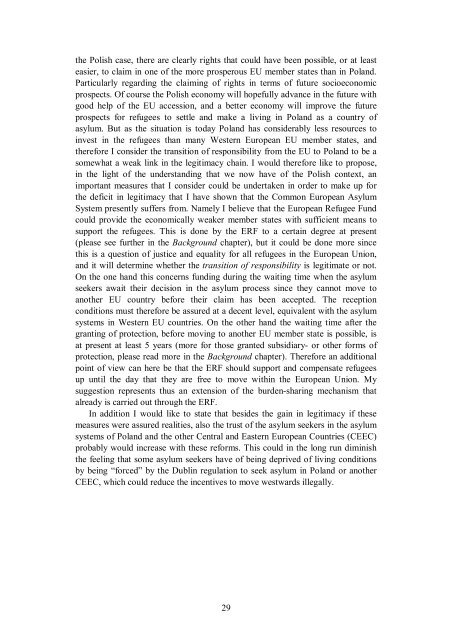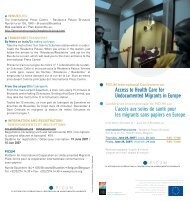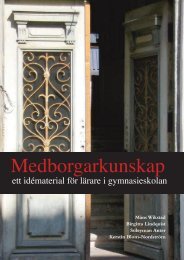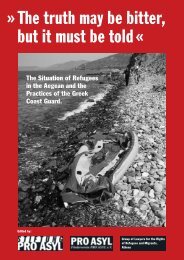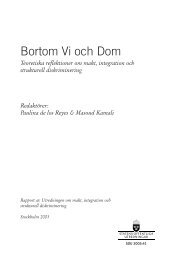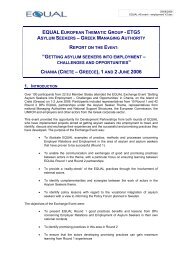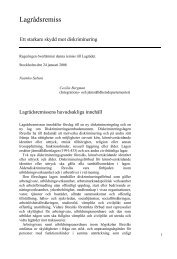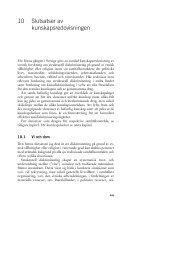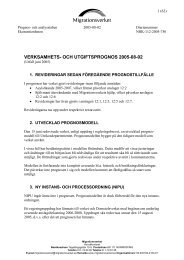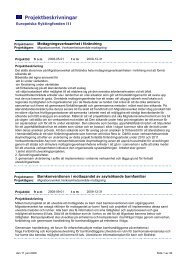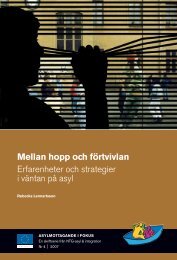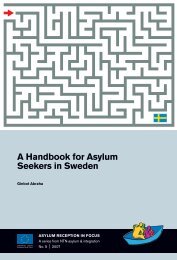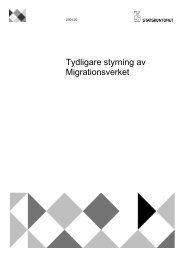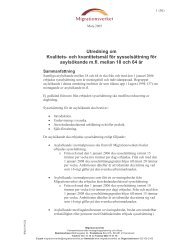The Common European Asylum System in Poland - Tema asyl ...
The Common European Asylum System in Poland - Tema asyl ...
The Common European Asylum System in Poland - Tema asyl ...
You also want an ePaper? Increase the reach of your titles
YUMPU automatically turns print PDFs into web optimized ePapers that Google loves.
the Polish case, there are clearly rights that could have been possible, or at least<br />
easier, to claim <strong>in</strong> one of the more prosperous EU member states than <strong>in</strong> <strong>Poland</strong>.<br />
Particularly regard<strong>in</strong>g the claim<strong>in</strong>g of rights <strong>in</strong> terms of future socioeconomic<br />
prospects. Of course the Polish economy will hopefully advance <strong>in</strong> the future with<br />
good help of the EU accession, and a better economy will improve the future<br />
prospects for refugees to settle and make a liv<strong>in</strong>g <strong>in</strong> <strong>Poland</strong> as a country of<br />
<strong>asyl</strong>um. But as the situation is today <strong>Poland</strong> has considerably less resources to<br />
<strong>in</strong>vest <strong>in</strong> the refugees than many Western <strong>European</strong> EU member states, and<br />
therefore I consider the transition of responsibility from the EU to <strong>Poland</strong> to be a<br />
somewhat a weak l<strong>in</strong>k <strong>in</strong> the legitimacy cha<strong>in</strong>. I would therefore like to propose,<br />
<strong>in</strong> the light of the understand<strong>in</strong>g that we now have of the Polish context, an<br />
important measures that I consider could be undertaken <strong>in</strong> order to make up for<br />
the deficit <strong>in</strong> legitimacy that I have shown that the <strong>Common</strong> <strong>European</strong> <strong>Asylum</strong><br />
<strong>System</strong> presently suffers from. Namely I believe that the <strong>European</strong> Refugee Fund<br />
could provide the economically weaker member states with sufficient means to<br />
support the refugees. This is done by the ERF to a certa<strong>in</strong> degree at present<br />
(please see further <strong>in</strong> the Background chapter), but it could be done more s<strong>in</strong>ce<br />
this is a question of justice and equality for all refugees <strong>in</strong> the <strong>European</strong> Union,<br />
and it will determ<strong>in</strong>e whether the transition of responsibility is legitimate or not.<br />
On the one hand this concerns fund<strong>in</strong>g dur<strong>in</strong>g the wait<strong>in</strong>g time when the <strong>asyl</strong>um<br />
seekers await their decision <strong>in</strong> the <strong>asyl</strong>um process s<strong>in</strong>ce they cannot move to<br />
another EU country before their claim has been accepted. <strong>The</strong> reception<br />
conditions must therefore be assured at a decent level, equivalent with the <strong>asyl</strong>um<br />
systems <strong>in</strong> Western EU countries. On the other hand the wait<strong>in</strong>g time after the<br />
grant<strong>in</strong>g of protection, before mov<strong>in</strong>g to another EU member state is possible, is<br />
at present at least 5 years (more for those granted subsidiary- or other forms of<br />
protection, please read more <strong>in</strong> the Background chapter). <strong>The</strong>refore an additional<br />
po<strong>in</strong>t of view can here be that the ERF should support and compensate refugees<br />
up until the day that they are free to move with<strong>in</strong> the <strong>European</strong> Union. My<br />
suggestion represents thus an extension of the burden-shar<strong>in</strong>g mechanism that<br />
already is carried out through the ERF.<br />
In addition I would like to state that besides the ga<strong>in</strong> <strong>in</strong> legitimacy if these<br />
measures were assured realities, also the trust of the <strong>asyl</strong>um seekers <strong>in</strong> the <strong>asyl</strong>um<br />
systems of <strong>Poland</strong> and the other Central and Eastern <strong>European</strong> Countries (CEEC)<br />
probably would <strong>in</strong>crease with these reforms. This could <strong>in</strong> the long run dim<strong>in</strong>ish<br />
the feel<strong>in</strong>g that some <strong>asyl</strong>um seekers have of be<strong>in</strong>g deprived of liv<strong>in</strong>g conditions<br />
by be<strong>in</strong>g “forced” by the Dubl<strong>in</strong> regulation to seek <strong>asyl</strong>um <strong>in</strong> <strong>Poland</strong> or another<br />
CEEC, which could reduce the <strong>in</strong>centives to move westwards illegally.<br />
29


